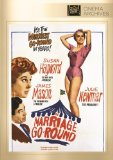| Reviews & Columns |
|
Reviews DVD TV on DVD Blu-ray 4K UHD International DVDs In Theaters Reviews by Studio Video Games Features Collector Series DVDs Easter Egg Database Interviews DVD Talk Radio Feature Articles Columns Anime Talk DVD Savant Horror DVDs The M.O.D. Squad Art House HD Talk Silent DVD
|
DVD Talk Forum |
|
|
| Resources |
|
DVD Price Search Customer Service #'s RCE Info Links |
|
Columns
|
|
|
Marriage-Go-Round (Fox Cinema Archives), The
Despite the mismatched leads, a frequently amusing adaptation of the Broadway play. 20th Century-Fox's Cinema Archives, their vault of hard-to-find library and cult titles, has released The Marriage-Go-Round, the 1961 sex comedy starring Susan Hayward, James Mason, Robert Paige, and statuesque bombshell, Julie Newmar. A popular, Tony Award-winning play from writer/director/producer Leslie Stevens, The Marriage-Go-Round film version is a little bumpy at times, particularly whenever snide James Mason seems to physically recoil ever so slightly from Brooklyn ball-buster Susan Hayward. However, the lines are still clever, and at times even witty, while we get a glimpse of wowzer Julie Newmar recreate her Tony-winning role as a Swedish sexpot looking to make a baby with already-married Mason. No extras for this only okay-looking anamorphic widescreen transfer.
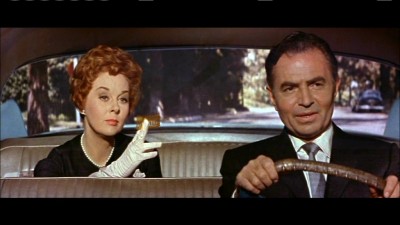
Florida college professor of cultural anthropology Dr. Paul Delville (James Mason) has a big problem. An old friend of his, a Swedish scientist who recently won the Nobel, is coming to visit, bringing along his daughter, Katrin Sveg (Julie Newmar). Paul's wife of 16 years, Dean of Women and lecturer on "Domestic Relations," Dr. Content Lowell (Susan Hayward), remembers Katrin well from the last time they saw her, 10 years prior, and kids Paul about watching out for her: Katrin, even as a leggy teen, had a big crush on Paul. Well, that crush has grown almost as much as Katrin's long, long legs, and when she shows up at Paul's and Content's home, sans father, she makes it clear to Paul she has one thing on her mind: she wants Paul to give her a baby. Naturally, Paul is flattered and amused at the same time, but Content is worried, in that bright, sophisticated fashion modern 1961 movie wives had, about Paul's ability to withstand Katrin's overwhelming assault. Rather quickly, when he realizes no-strings Katrin means business about having sex, Paul becomes quite worried, as well....
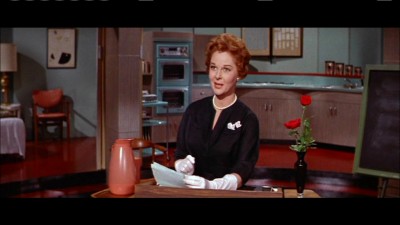
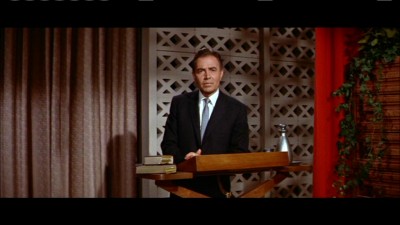
From what I could gather about the original The Marriage-Go-Round play, it was quite popular with audiences when it debuted on Broadway in the fall of 1958 (it ran for two years, with over 700 performances), winning a Tony for Newmar as Featured Dramatic Actress, and a lead nomination for screen legend, Claudette Colbert, who starred alongside equally iconic Charles Boyer. Author Leslie Stevens (probably best known as the creator of cult TV favorite, The Outer Limits), produced and wrote the screenplay for this 1961 movie adaptation, as well, with genial studio journeyman Walter Lang directing Newmar and the new leads. The movie received mixed reviews, and wasn't a hit at the box office, racking up another critical and box office disappointment for top-billed Susan Hayward, who was trying to cash-in big-time on her 1958 Lead Actress Oscar with three high-profile yet unsuccessful releases in 1961: Ada, with Dean Martin, the remake of the venerable melodrama, Back Street, and Marriage.
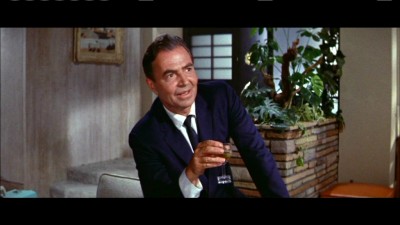
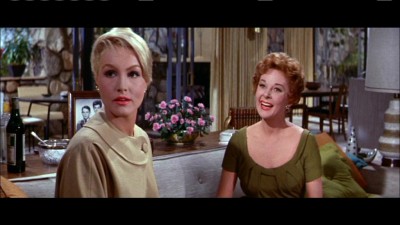
With even the most seemingly innocuous family entertainment today irrevocably tinged by salacious humor (even boarding on the pornographic at times), it's hard to imagine that there was a time on the American movie screens when the subject matter of a movie like The Marriage-Go-Round was considered quite risqué. The basic set-up of this almost-screwball romantic farce is fairly conventional. When the movie opens with Mason giving a snickering lecture on the joys of monogamy (while swearing to God that he's faithful to the idea), and Hayward gives a lecture on the superiority of women, guiding their potentially "wandering" husbands around like little boys, we immediately get where The Marriage-Go-Round is going to go. However, the implied jokes about "swinging" and "open" marriages (those come in the first few minutes), and "going Scandinavian" and all the sexually libertine practices that term implied to American audiences back in the 1950s and 1960s, and the frankly shocking (for 1961) notion that Newmar would want married Mason to impregnate her without being wed (she even blithely throws out "illegitimate," telling Mason Americans are uptight about it), those themes weren't at all common on the movie screens back in 1961.
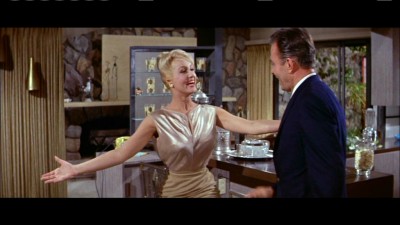
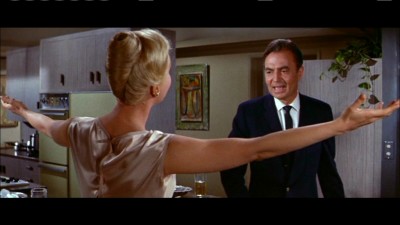
Of course, like almost all of these romantic/sex comedies of the 1960s, no matter how smutty everyone pretends or purports to be, the sophistication of the performers and the glossy surroundings they inhabit, give the storylines a glittering falseness that quickly transform the adult themes into humorously contrived fantasies. Mason and Hayward here are college professors who speak in an uninterrupted, impossibly clever series of verbal dodges and parries and ripostes. No matter what they're implying here, whether it be adultery or surrogacy, no one in the audience is going to be offended because the performers are so clearly fictional creations. And just to make sure no one goes home outraged, all misunderstandings are neatly tied up into a conservative bow by the final fade-out: leering Mason doesn't really cheat with Newmar; panting, heaving Newmar doesn't really want a sperm donor but a husband (she politely bows out of the scenario when she's made to realize this), and shaken Hayward regains the upper hand in the female-dominated American household of the mid-20th century by making Mason beg for forgiveness. Order, as they say, is restored.
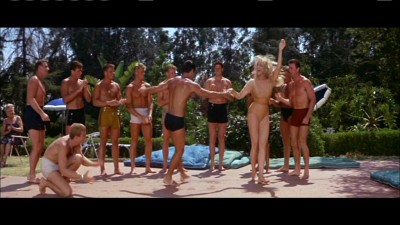
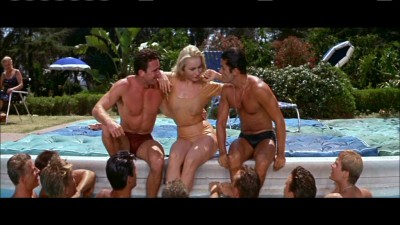
Director Walter Lang (lots of innocuous, genial comedies and musicals like The Little Princess, Moon Over Miami, State Fair, Cheaper By the Dozen, The King and I, Can-Can) shoots The Marriage-Go-Round not only like a Broadway play, with the camera back far enough for mostly full-shots, with actors balanced out perfectly in the long frame, and few if any real close-ups, but also like one of those early CinemaScope® features, complete with its technical drawbacks...like the camera back far enough for mostly full-shots, with actors balanced out perfectly in the long frame, and few if any real close-ups. Lang's final movie, Snow White and The Three Stooges, was released the same year as The Marriage-Go-Round (there's a spread...) , and visually, they're no different from any of his other films. Lang's largely "hands-off" style of filming a play was already antiquated by 1961; today, it looks positively calcified. Sure, that anonymous, sterile style inadvertently helps us concentrate on the clever lines here, but it also deadens the experience overall. The worst example of this is, ironically, a scene that was probably inserted into the movie to "open up" the play: a pool party where Lang has a chance to show off stacked, leggy Newmar...by keeping the camera way, way back (Newmar, a skilled dramatic actress overshadowed by the impact of her imposing physique, is absolutely edible here in The Marriage-Go-Round, making any guy in the audience weak-kneed at the thought of having to try and fight her off).
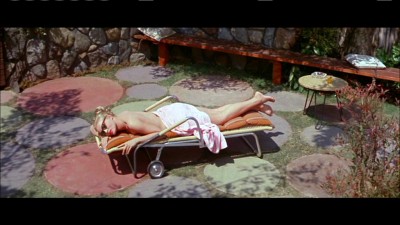
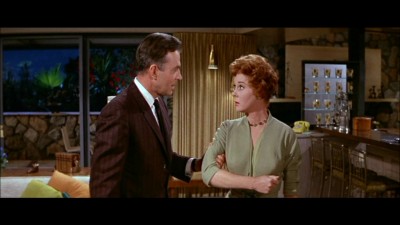
As for The Marriage-Go-Round leads here...it's a shame that Boyer and Colbert couldn't have recreated their roles (admittedly, those CinemaScope® lens would have been far less forgiving to the older actors, rather than the greasepaint and spotlights of a big Broadway theater). James Mason can't really give the jokier lines here their due; he's not an up-front comedian (when he delivers lines like, "Bottoms up," or "The only thing left is to eat you up," to Newmar, they sound vaguely filthy, not exactly funny). He's always been sly, and dark, and snarky, and almost effete in his on-screen comedy (listen to the comedy and anguish packed into a simple, "Lolita!" from the same-named Kubrick movie). So a Broadway play with a lot of funny one-liner set-ups and rejoinders was probably not the best fit for his cynical, sometimes even seedy humor (often that mismatch here is unintentionally hilarious: when he moans to Newmar, "I'm sorry if I sounded patronizing," I wrote in my notes, "When has Mason ever NOT sounded patronizing?"). However, Mason was always good at getting across a kind of passionate anguish, and so he's quite amusing in his reaction shots and flailings whenever pneumatic/emphatic Newmar presses in close. You can tell he'd like to go even further with this kind of nervous, anxiety-ridden comedy, but the part calls for him to be relentlessly sophisticated (and thus ultimately reined in and "proper"), so his attempts at humorous "builds" are notably blocked.
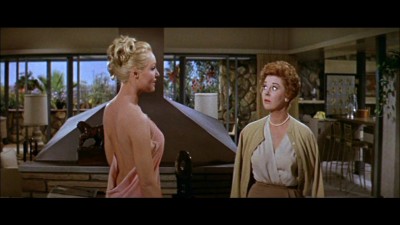
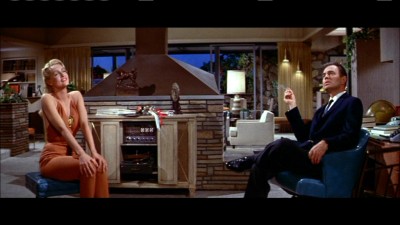
The one who really loses out in The Marriage-Go-Round is its leading lady, Susan Hayward. Why did she think this would be a good vehicle for her talents? For a big, big star...it's a nothing role; her screen time is noticeably less than Mason's and Newmar's, and most of the role consists of indulgently bantering with dying-to-stray Mason, treating him more like a mother scolding a naughty boy rather than as an increasingly worried wife with a cheating husband. Besides, comedy was never steely Hayward's métier―who thinks of Susan Hayward when they think of comedic actresses? Sure, she can deliver some of the acerbic lines here with a bit of bite (when couldn't she snap those off?), but critically, there's no playfulness in them, no sense of inward appreciation for the basic absurdity of the situation. After all, who's gonna believe that Susan Hayward would blithely turn the other cheek and let some other broad try and take her man? She's playing it too straight, too realistically, and it all comes out rather arch and glossy and leaden, as if this Brooklyn-born melodrama queen couldn't loosen up and have a little fun. Unfortunately, this approach only makes the viewer wish she would pop up less here, and let funny Mason and sexy Newmar get down to it...and I'm sure that's not the result Hayward had in mind.
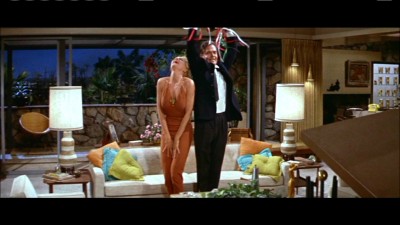
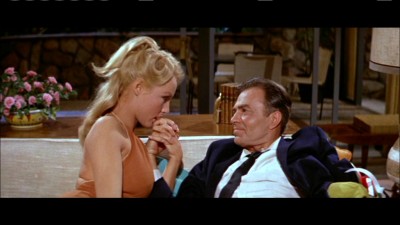
The DVD:
The Video:
You gotta love Fox's Cinema Archives. First, they dump all those widescreen CinemaScope® titles in wretched pan-and-scan versions, and then they release an anamorphically-enhanced, 2.35:1 widescreen transfer like The Marriage-Go-Round...and incorrectly label it "letterboxed" on the back of the DVD cover. Go figure (is it me, or does it look like there's still a very slight "squeeze" here?). The image is okay, with a bit of grain, slightly muddy color, and a certain amount of compression problem that gives a less than razor-stable image.
The Audio:
The Dolby Digital English mono audio track has a lot of hiss, surprisingly...but at least I don't have to hear that clown Tony Bennett imitate Eddie Fisher and sing the title track in stereo.
The Extras:
No extras for The Marriage-Go-Round.
Final Thoughts:
Miscast, but still funny whenever James Mason quivers at the thought of nailing Amazonian Julie Newmar. Susan Hayward is out of her element in this sophisticated sex comedy, and director Walter Lang directs this like someone walking by a window shop display, but it's still worth a peek for fans of the stars. I'm recommending The Marriage-Go-Round.
Paul Mavis is an internationally published movie and television historian, a member of the Online Film Critics Society, and the author of The Espionage Filmography.


|
| Popular Reviews |
| Sponsored Links |
|
|
| Sponsored Links |
|
|
| Release List | Reviews | Shop | Newsletter | Forum | DVD Giveaways | Blu-Ray | Advertise |
|
Copyright 2024 DVDTalk.com All Rights Reserved. Legal Info, Privacy Policy, Terms of Use,
Manage Preferences,
Your Privacy Choices | |||||||









